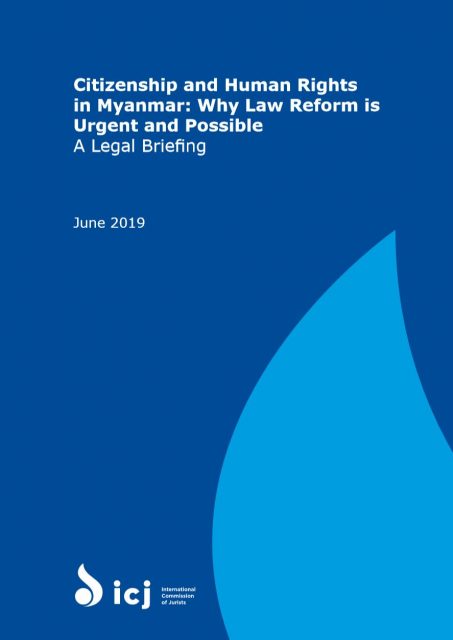Citizenship Law and Human Rights in Myanmar: Why Law Reform is Urgent and Possible


Overview
Myanmar’s legal framework for citizenship is incompatible with bedrock rule of law and democratic principles. In particular, the 1982 Citizenship Law is highly discriminatory and arbitrary, and manifestly fails to satisfy the State’s obligations under international human rights law. The result is a system that enables widespread discrimination throughout the country and undermines the rule of law.
The Government of Myanmar can and should enact reforms to citizenship law necessary to build an inclusive pluralist democratic society inline with human rights and the rule of law, primarily through initiating constitutional and legislative reforms.
Core principles of international law and the rule of law include non-discrimination, non-arbitrariness, the universality of human rights, and the right to equality before the law and to equal protection of the law without discrimination. All States are obliged to respect, protect and fulfill the human rights of every person on their territory or otherwise within their jurisdiction, without discrimination, including discrimination on the grounds of citizenship, nationality or migration status. International human rights law intentionally does not limit rights protections to citizens. States’ obligations towards individuals do not depend on their particular legal status, except for a limited number of provisions explicitly applicable to special categories, which are generally limited to the right to vote, and to hold public office.
The 1982 Law, enacted by an unelected and xenophobic military government, embedded in legislation the concept of “national races” (Burmese: တုုိင္းရင္းသားလူမ်ဳိးမ်ား / taingyinthar lumyo mya). Previously, the concept of “indigenous races” had existed in national law, since 1948.3 Section 3 of the 1982 Law attributes the “national races” to eight specific ethnic groups. The Law introduced a corresponding hierarchy of citizenship categories that effectively prescribes first-class and second-class citizens based on this framework. Members of “national races” are considered as (full) “citizens”, while others, including individuals with mixed ancestry, may be eligible for “associate citizenship” or “naturalized citizenship” (for a discussion of these concepts, see the above text box). Under this law, the legal rights of associate and naturalized citizens are inferior, are subject to restrictions, and may also be subject to revocation. The 1982 Law, and three related bylaws enacted in 1983, contain an unwieldy total of 26 chapters, with 251 sections and 51 forms.
The intentionally discriminatory character of the 1982 Law, and its equally discriminatory implementation in practice, partly explains why many residents lack a legal identity (more than 25 percent, according to the 2014 Census).4 Under this system, many life-long residents of Myanmar have effectively been rendered stateless,5 including members of entire ethnic groups, and children of mixed ancestry. While section 347 of the 2008 Constitution states “The Union shall guarantee any person [emphasis added] to enjoy equal rights before the law,” other constitutional provisions conflict with this, and with principles of international human rights law, by narrowly defining rights as being limited only to citizens. The State generally does not recognize its obligations to respect and to protect the rights of those who do not qualify for citizenship under domestic law, due to its discriminatory provisions and or application.
The resulting system institutionalizes discrimination on the basis of race or ethnicity. Second-class citizens, including persons colloquially labeled as “mixed blood,” experience varying types and degrees of discrimination, particularly in their dealings with the State, affecting nearly every aspect of life, from freedom of movement to registering marriages to accessing education. Discrimination and its effects are more acute for persons who are not recognized as citizens at all, based on their race or ethnicity. In addition, certain constitutional provisions restrict the rights of citizens who have an immediate relative (parent, spouse or child) who is not a citizen, including the right to stand for parliament or to become President.
Download full report in English here.
Download full report in Burmese here.

